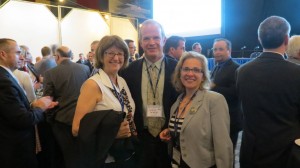By Rachel Ward

Jose Figueroa has been called a terrorist, but the happily married father of three has never been convicted – or charged – of a crime.
In fact, he spends all his time in church. That is, locked in a church basement. He’s hiding there from the Canadian Border Services Agency and deportation.
“They are divorcing me from my family,” said Figueroa, on the phone from Walnut Grove Lutheran Church in Langley, B.C.
Almost twenty years ago Figueroa left his home country of El Salvador for Canada, running from what he believed to be real-life death threats. After over a decade of living in fear, he arrived to two more of living in limbo. Now he may have a fresh chance to stay in Canada and live with his family.
A federal court judge, Richard Mosley, has ordered a new immigration official try Figueroa’s previously rejected permanent residency application based on humanitarian and compassionate grounds. Mosley says the humanitarian argument is “exceptionally strong,” and that the previous judge ignored how much Figueroa’s son with autism needs a stable environment. Figueroa says he plays a big role in his son’s development, meeting with teachers and spending “thousands” a year on therapy. Now, he says, the family is only being supported by Figueroa’s sister, a permanent resident in Canada, who owns a house with him and his wife. His wife acts as a full time caregiver for their eldest son.
In July Mosley, through the judicial review, found the previous decision to be “unreasonable” and Figueroa’s previously-called terrorist activities to be those of a “non-combatant political advocate.”
Figueroa came to Canada in 1997 as a refugee from El Salvador, a Central American country half the land mass of Nova Scotia, yet 20 times as densely populated. It sits along the Pacific coast, dotted with active volcanos. The biggest eruption came from the people, about thirty years ago when the country broke into civil war following a coup that killed protesters. Figueroa was a student at the University of El Salvador in Santa Ana at the time.

Figueroa was a member of a student union, and a communist splinter group of the Farabundo Martí National Liberation Front, or FMLN, a civilian organization formed during the war to resist the government. These groups were fighting a right-wing government that led like a military dictatorship – and some fought with violence. Figueroa, instead, court documents show, he led student protests and educated his classmates on peaceful resistance. After the war, he and his wife taught classes to rehabilitate FMLN soldiers.
A timeline of events relevant to Figueroa’s court case:
The judge says Figueroa may have been guilty of “willful blindness,” but there’s no evidence to suggest he knew about, let alone was involved in, violence by the FMLN. A truth commission conducted by the United Nations following a brokered peace agreement found 85 per cent of war crimes were committed by the government and its agents, and about 5 per cent by FMLN. Figueroa says, if anything, his student union’s political activities put them in danger’s way.
“There were many member of my student organization that I was the general secretary of that were captured, murdered, kidnapped,” said Figueroa. The commission says, that on his campus in 1989, army members opened fire on 15 students, killing one and wounding six others. On other campuses across the country, university professors were being killed, as well.
Citizen and Immigration Canada says at issue is Figueroa’s involvement in FMLN when it was a guerrilla group that committed terrorist activities during the war. For example, the truth commission found the army executed civilians en masse, and death squads averaged about eight civilian deaths a month in 1987. FMLN then retaliated by murdering eight mayors, and threatening right-wing informers. The judicial review says Figueroa was instead involved with the FMLN as “a political activist,” and “did not take up arms against the government.” The judge goes on to say FMLN is not a terrorist group, comparing it to the resistance against Apartheid South Africa, and now a political group with “broad support.”
CIC refused an interview for this article, and instead emailed a statement. It also points out that an on-going judicial review does not automatically cancel the arrest warrant, and the CBSA, also in an email statement, said the arrest warrant for avoiding deportation stands.
Figueroa says he still is not safe returning to El Salvador, something his original judge disputed when turning down Figueroa’s refugee application. Figueroa says, either way, the country is not safe, and has severe gang violence – and he would have no job or family support if he were to return. The homicide rate is one of the highest in the world, according to United Nations crime data, and almost 26 times greater than Canada’s.

This judicial review says Canada and El Salvador now enjoy normal diplomatic relations, with Canada importing more than $110-million worth of its goods in 2013, mostly coffee, cane sugar and clothing. The FMLN is not on Canada’s list of terrorist entities. In fact, the judge says FMLN was resisting an oppressive regime, much like the anti-apartheid movement in South Africa. The judge says proof of Figueroa being inadmissible on these grounds was “simply not good enough.”
Figueroa says his main concern is that his family would be left “as if I was dead and my wife was a single mother.”
Listen to Jose Figueroa speak about his son’s autism:
Audio PlayerBoth Figueroa and his wife applied originally for humanitarian and compassionate grounds based on their son’s autism. The first judge ruled his wife could stay on that basis, but rejected Figueroa, saying the family could stay in touch by visiting El Salvador and using technology such as Skype. This new judge leans more in Figueroa’s favor.
“I have the right and my children have the right to be with me,” said Figueroa. “I am not an irresponsible father who will just leave our kids alone. I have always been supportive of them. And that’s what they are taking away from my family.”
Figueroa is hoping to get a certificate saying he’s not a terrorist – and therefore, not inadmissible, in his logic. This this request was turned down in early September.
Until the new CIC assessment comes out, Figueroa waits in the basement of the church with only the internet for company. All three of his kids are back to school. His wife will be attending those teacher meetings alone, to make sure her autistic son will do well in school.




